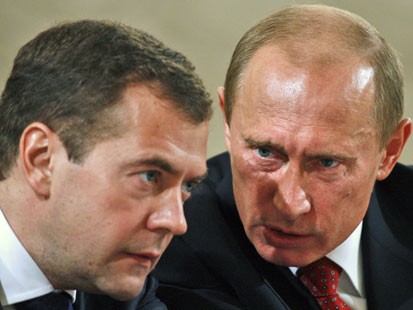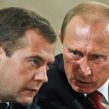
ECONOMIC FUNDAMENTALS ARE WORRISOME FOR THE MEDVEDEV-PUTIN “TANDEMOCRACY”
Publication: Eurasia Daily Monitor Volume: 5 Issue: 144
By:

The experimental power-sharing construct in Russia with authoritative Vladimir Putin as prime minister and very active Dmitri Medvedev as president has been working remarkably smooth so far, as the two leaders have been extra careful to avoid any incoherence in their performance. The presidential administration and the government, despite their deeply overlapping functions, have painstakingly demarcated the boundaries of their authority and demonstrated restraint in asserting their bureaucratic power (Nezavisimaya gazeta, July 23). What has reduced speculation among the community of expert rumor-traders during the relaxed summer period is the quiet retreat of siloviki from the political arena, so that only the ongoing reshuffling of the top brass recalls the recent “clan wars” (Kommersant, July 23).
The foundation for this political harmony has been provided by Russia’s strong economic growth—but it is exactly in the economic sphere that the symptoms of stagnation are coming to the surface, despite the continuing inflow of “petro roubles.” The most directly deleterious of these symptoms is inflation, which has reached 9.3 percent, while the target “corridor” for the year is 8.5-10.5 percent (Gazeta.ru, July 23). The steady climb in prices has made Moscow the most expensive city in the world, overtaking New York by as much as 50 percent (Vedomosti, July 25). The government has toned down its counter-inflation rhetoric but feels obliged to increase “compensations” to pensioners and state employees as well as pump more funds into struggling “national projects” in health care and education. Finance Minister Aleksei Kudrin is using his hard-earned direct access to Putin to block at least some pressure from the money-hungry lobbies, which exposes him to relentless slander as his deputy Sergei Storchak remains behind bars (Gazeta, July 17; Vremya novostei, July 24).
This deepening quagmire threatens to sink Medvedev’s idea of Russia becoming a global financial center, an idea that is rather far-fetched for a poor country with too much money. Until recently, inflation did not seem to affect Russia’s healthy growth, but in the summer the industries have registered a slow-down, which the government has tried to explain away by the distraction of the European football championship (Polit.ru, July 25). The stock market, which generally is a more reliable indicator than the official forecasts, has been falling since mid-May with a total decline of about 20 percent, including the sharp 5.5 percent drop last Friday (RBC, July 25). This “correction” is partly driven by the turmoil on the global stock exchanges but every small slip in oil prices engenders pessimism in Russian traders.
Russia’s own energy sector—instead of being a locomotive of growth—shows slack activity and hardly any vigor in increasing efficiency, and continues to be cost-ineffective. State-owned companies are investing in doubtful assets and irrelevant projects, while others’ futures are uncertain, and the TNK-BP is still paralyzed by an over-reliance by its Russian co-owners on the special services’ “invisible hand” (Kommersant, July 25). Medvedev’s recent decision to grant the government the right to award licenses for developing new off-shore oil and gas fields without any contests or auctions shows that state control over this sector is tightening—and guarantees that no new development will happen anytime soon (Ezhednevny zhurnal, July 22). Moscow appears quite content to free-ride on the supply problems in the world energy markets while presenting itself as an energy security provider.
One consequence of this behavior is the sharp climb of prices in domestic gas stations, which hurts the growing millions of car owners. Government responses to these accumulating economic distortions have been characteristically interventionist as various agencies, including the State Prosecution, have been ordered to investigate corporate machinations that allegedly drive inflation. It was Putin’s harsh criticism of the coal and metal company Mechel that triggered panic sales on the Russian stock market last Friday (Vedomosti, July 25; Newsru.com, July 26). The case may be as “special” as the one with Yukos back in 2003, but it betrays the fundamental distrust in market mechanisms and the very Soviet belief in “manual control” over economy—complex as it has grown—typical of Putin’s “team,” of which Medvedev is a distinguished member.
This dirigisme, resembling “zero tolerance” policing of the economic arena, generates mixed reaction in a society where large segments are still longing for a reversal of privatization (Gazeta.ru, July 25). At the same time, according to a Levada Center poll, the younger part of the middle class is divided about whether the country has achieved stability, as 59 percent believe that the situation could change any moment (Levada.ru, July 1). Medvedev was questioned by Western journalists about the widespread desire in this group to leave the country, but he argued that the increased mobility was not a “headache” but a democratic achievement. This kind of denial is reinforced by the “good-news-only” propaganda campaign and the unlimited supply of entertainment, which is possibly the most dynamic industry in a country that has sunk deep into political apathy. Moscow enjoys the still-abundant fruits of petro-prosperity, so its rentier-bureaucrats, fancying themselves as a “creative class,” maintain a moderately optimistic outlook (Gazeta.ru, July 21, 24).
Putin and Medvedev encourage this “enjoy-it-while-it-lasts” attitude but their hands-on management quite possibly only serves to stifle economic activity and bring the horizon of stagnation closer. The problem with their “tandemocracy,” which is merely a travesty of democracy, is that no institutional safety net is available for a sudden turn in fortune—and those cannot be talked out of existence. The attempts to scapegoat a negligent minister or a greedy oligarch even now look far from convincing, and the issue of responsibility for a possible economic tremor, even if of medium magnitude, remains yawningly open. Putin has gambled on a good-weather political arrangement, and now has reasons to worry about every cloud—just as the winds are gathering power.




